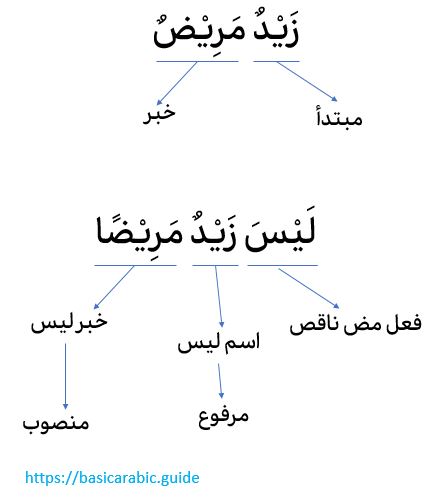Ism Laisa - Durusul Lughah book 2 - lesson 2
We've learned nominal sentence (جملة الاسميّة).
Let me recap the nominal sentence. Nominal sentence is sentence that is started with noun.
In the nominal sentence or jumlah ismiyyah, subject is called mubtada' (مبتدأ), and predicate is called khabar (خبر).
Examples of jumlah ismiyyah
- أَنَا مُجْتَهِدٌ = I'm diligent.
أَنَا is mubtada', whereas مُجْتَهِدٌ is khabar.
- القَلَمُ مَكْسُورٌ = The pen is broken.
القَلَمُ is mubtada', whereas مَكْسُورٌ is khabar.
The rules of jumlah ismiyyah
1. mubtada' is in nominative case (مرفوع).
2. khabar is in nominative case (مرفوع)
Now, we'll study the لَيْسَ (laisa).
The rules of laisa (لَيْسَ)
1. لَيْسَ means "is not", in other word laisa is used to negating a sentence.
2. لَيْسَ is inserted in jumlah ismiyyah (jumlah which contains mubtada' and khabar).
After the introduction of لَيْسَ , the mubtada then becomes ism laisa (اسم ليس), and khabar becomes khabar laisa (خبر ليس)
3. The case after the introduction of laisa
Before introduction of laisa
زَيْدٌ مَرِيْضٌ = Zaid is sick.
- زَيْدٌ is called mubtada', it's marfu' (nominative case). The indication of it's rafa' is dammah "u"
- مَرِيْضٌ is called khabar, it's marfu', the indication of it's rafa' is dammah "u"
After introduction of laisa
لَيْسَ زَيْدٌ مَرِيْضًا = Zaid isn't sick.
- لَيْسَ = fi'il madi naqis (فعل ماض ناقص)
- زَيْدٌ = ism laisa, marfu, it's marfu' by dammah "u"
- مَرِيْضًا = khabar laisa, mansub (منصوب) or accusative case, it's mansub by fathah "a"
4. We can insert har jar ب (ba) at khabar laisa.
Examples:
زَيْدٌ مَرِيْضٌ = Zaid is sick.
لَيْسَ زَيْدٌ بِمَرِيْضٍ = Zaid is not sick.
notes:
مَرِيْضٍ is majrur because of harf jar ب
5. Laisa with the damir
هُوَ -> لَيْسَ
هُمْ -> لَيْسُوا
هِيَ -> لَيْسَتْ
هُنَّ -> لَسْنَ
أَنْتَ -> لَسْتَ
أَنْتُمْ -> لَسْتُمْ
أَنْتِ -> لَسْتِ
أَنْتُنَّ -> لَسْتُنَّ
أَنَا -> لَسْتُ
نَحْنُ -> لَسْنَا
Examples:
- Zainab is not sick: لَيْسَتْ زَيْنَبُ مَرِيْضَةً or لَيْسَتْ زَيْنَبُ بِمَرِيْضٍ
- We are not from India: نَحْنُ لَسْنَا مِنَ الهِنْدِ




No comments:
Post a Comment